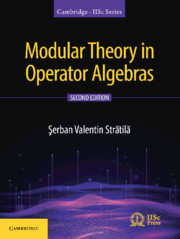Book contents
- Frontmatter
- Dedication
- Contents
- Preface to the Second Edition
- Preface to the First Edition
- Chapter I Normal Weights
- Chapter II Conditional Expectations and Operator-Valued Weights
- Chapter III Groups of Automorphisms
- Chapter IV Crossed Products
- Chapter V Continuous Decompositions
- Chapter VI Discrete Decompositions
- Appendix
- References
- Notation Index
- Subject Index
Chapter II - Conditional Expectations and Operator-Valued Weights
Published online by Cambridge University Press: 16 October 2020
- Frontmatter
- Dedication
- Contents
- Preface to the Second Edition
- Preface to the First Edition
- Chapter I Normal Weights
- Chapter II Conditional Expectations and Operator-Valued Weights
- Chapter III Groups of Automorphisms
- Chapter IV Crossed Products
- Chapter V Continuous Decompositions
- Chapter VI Discrete Decompositions
- Appendix
- References
- Notation Index
- Subject Index
Summary
Conditional Expectations
In this section, we introduce a special kind of positive linear mapping, called a conditional expectation, and give some applications to tensor products.
Let be a C*-algebra and a C*-subalgebra
A linear mapping is called a projection if Φ(b) = b for every. In this case and.
A linear mapping is called -linear if Φ(ab) = Φ(a)b and Φ(ba) = bΦ(a) for every.
A -linear projection which is also a positive mapping, that is, is called a conditional expectation.
Theorem (J. Tomiyama). Every projection of norm 1 of the C*-algebra onto the C *-subalgebra is a conditional expectation.
Proof. Consider first a norm 1 projection of a W*-algebra onto a W*-subalgebra Then is a W*-algebra and its unit element is a projection.
Let e be a projection in, put f = 1 − e, and assume that either e or f is in. For any, both ex and fx are then in and for we have
So for
As is arbitrary, we have, that is, Interchanging e andf, we have. Thus
Putting Let be any positive form on and Since by ([L], 5.4.) it follows that 𝜑 is positive. Hence Φ is positive and so self-adjoint. Taking adjoints in (1) we have
Since the W*-algebra is the closed linear span of its projections ([L], 2.23), by (1) and (2) it follows that for
In the general case, when Φ is a projection of norm 1 of the C*-algebra onto its C*-subalgebra, we consider the second transpose, mapping of the second dual W*-algebra onto the second dual W*-algebra(A.15, A.16).
Information
- Type
- Chapter
- Information
- Modular Theory in Operator Algebras , pp. 99 - 158Publisher: Cambridge University PressPrint publication year: 2020
